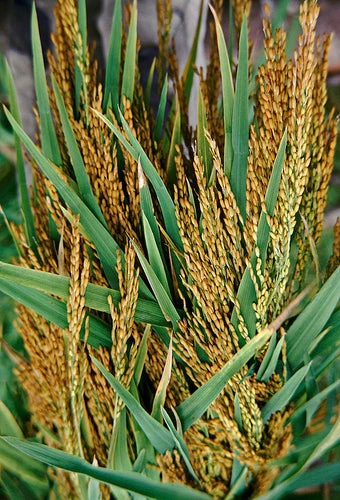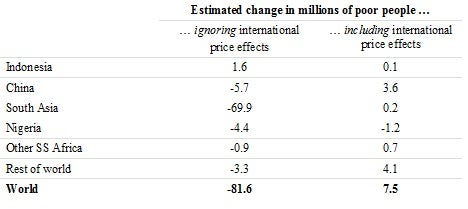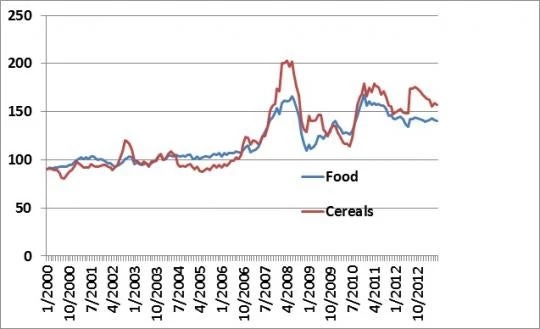
Sudden jumps in food prices can have serious social consequences. In mid-2008, the doubling of rice prices prompted urban riots in dozens of developing countries. Increases in food prices also may have contributed to the unrest before the Arab Spring. Not only are food prices politically sensitive, but they disproportionally affect poor net buyers of food, who spend a large fraction of their incomes on food. So it is with good reason that national governments watch food prices carefully.
Figure 1: Monthly real food price indexes in international markets, 2000 to June 2013. Source: FAOSTAT.
But the issue requires taking a view that is broader than one nation’s. Certainly in the countries that insulated food prices, fewer people who are net buyers of food would have fallen into poverty. But such policy actions had two other effects that actually increased poverty. First, they hurt poor farmers and others who sold more food than they bought – and may have kept those people from rising above the poverty line.
The second effect is more subtle, and double-barreled. By restricting exports or lowering import barriers on tradable food staples, these policies exacerbated the international price spike. As a consequence they may have driven more people into poverty in other countries than they helped in the responding countries. In addition, this boost to international prices may also have undermined the desired effect at home.
This second effect ensures that, even when it may appear to each individual country that its policy action has kept poverty in check, that so-called success may be an illusion. The policy may look successful when the rise in domestic food prices is compared to the actual rise in international markets. What is relevant, though, is what the international price rise would have been had no countries altered their trade restrictions. Indeed, it has been shown that if the same proportion of the world’s exporting and importing country groups happened to insulate to the same extent, domestic prices in both country groups would rise just as much as if no country had insulated. This is akin to a crowd of people of equal height in a stadium trying to see better by standing up.
In reality, however, countries intervene to different extents and the system of cause-and-effect is complex. The impact of price insulation on poverty in any one country depends on both the actions taken by that country and the collective impact of interventions by all other countries. It also depends on the structure of each economy and, in particular, on what proportion of households is near the poverty line and the proportions of those vulnerable households that are net buyers or sellers of staple foods.
Many scenarios are possible. On the one hand, if countries where the poor are most adversely affected by higher food prices insulate more than countries where the poor are less vulnerable to (or would benefit from) food price spikes, it is possible that such insulation would reduce the number of people driven into poverty.
On the other hand, certain countries that insulate against food-price shocks may have no effect on poverty or they may exacerbate it. In high-income countries that continue to use insulating policy instruments, for example, even relatively poor consumers spend only a small share of their income on farm produce. By contrast, in some net food-exporting countries such as Vietnam, higher food prices may reduce poverty because there are many relatively poor farmers who are net sellers of food.
To sort out the actual, net effects of recent food-trade restrictions, our paper looks at data on the changes in agricultural trade restrictions during periods of rapid increases in international food prices. We then estimate the impacts of consequent domestic price changes on poverty in different countries.
We first look at consumption patterns and income sources of low-income households in a sample of 30 developing countries in which three-quarters of the world’s poor live. We assess which food commodities are likely to be most important in affecting poverty. We provide new estimates of agricultural price distortions to assess the extent to which countries insulated their domestic market from the changes in international food prices during 2006–08. Then, we use a simple model to compare the actual changes in domestic prices with those that would have occurred in the absence of price-insulating policies. Finally, these price scenarios are used to assess the impacts of food price changes on poverty both with, and in the absence of, price-insulating policy behavior.
This approach allows us to make a much broader assessment of the impacts of price-insulating behavior on national and global poverty than has previously been available. We find that market-insulating actions added substantially to the spike in international prices for rice, wheat, maize and oilseeds. As a result, while domestic prices rose less than they would have without insulation in some developing countries, in many other countries they rose more than they would have if no country had altered their trade restrictions.
Our study finds that the actual poverty-reducing impacts of insulation are much less than their apparent impact. If we ignore the impact of policy actions on international prices, we estimate that 82 million people were saved from falling below the $1.25 international poverty line. But, if we take into account the impact on international prices – so as to better reflect reality – we estimate that global poverty increased by 8 million people (though that result is not significantly different from zero). In South Asia, the difference is dramatic: Table 1 shows the estimated number saved from poverty falls from 70 million to virtually none.
Table 1: Poverty effects of countries insulating themselves from the 2006-2008 spike in international food prices. Source: Anderson, Ivanic and Martin (2013).
One implication of these findings is clear: trade policy is not the best instrument to fight poverty. Much better suited for that goal are domestic policy instruments such as conditional cash transfers, which provide social protection for the poor far more efficiently and equitably than variations in border restrictions. This suggests it is time to seek a multilateral agreement to desist from changing restrictions on trade when international food prices spike, and to focus on measures that can actually reduce—rather than merely rearrange—the adverse impacts of high food prices on the poor.
A version of this post appeared on the World Bank's Let's Talk Development blog on Aug. 21, 2013.




Join the Conversation